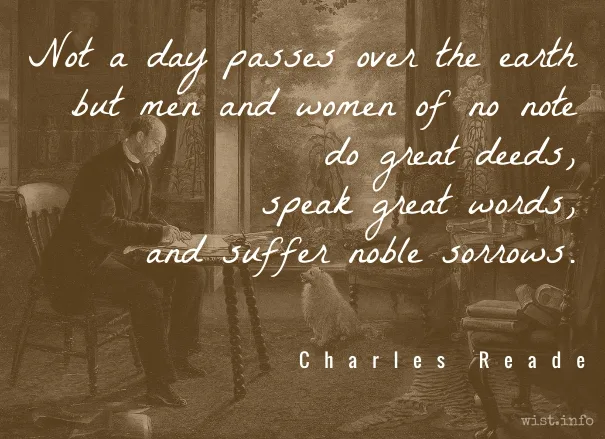Men’s ideas are like card-playing or any other game. Ideas which in the past I’ve seen considered reckless have since become commonplace, almost trivial, and adopted by men unworthy of sharing them. Ideas which now seem extraordinary will be regarded feeble and perfectly ordinary by our descendants.
[Les idées des hommes sont comme les cartes et autres jeux. Des idées que j’ai vu autrefois regarder comme dangereuses et trop hardies, sont depuis devenues communes, et presque triviales, et ont descendu jusqu’à des hommes peu dignes d’elles. Quelques-unes de celles à qui nous donnons le nom d’audacieuses seront vues comme faibles et communes par nos descendans.]Nicolas Chamfort (1741-1794) French writer, epigrammist (b. Nicolas-Sébastien Roch)
Products of Perfected Civilization [Produits de la Civilisation Perfectionée], Part 1 “Maxims and Thoughts [Maximes et Pensées],” ch. 2, ¶ 145 (1795) [tr. Parmée (2003), ¶ 115]
(Source)
(Source (French)). Alternate translations:Men’s ideas are like cards and other games. Ideas which I remember to have seen regarded as dangerous and over-bold have since become commonplace and almost trite, and have descended to men little worthy of them. So it is that some of the ideas which to-day we call audacious will be considered feeble and conventional by our descendants.
[tr. Hutchinson (1902), "The Cynic's Breviary"]Man's ideas are like card & other games. Ideas which I once heard stigmatised as dangerous and over-daring have since become common and even trivial, and have sunk to be the tenets of quite unworthy persons. Some ideas which we call audacious nowadays will seem feeble and ordinary to our descendants.
[tr. Mathers (1926)]The ideas of men are like cards and other games. ideas that at one time, to my own knowledge, were considered dangerous and rash, have since become general, almost commonplace, and have descended to men who are little worthy of them. Some of those that we call daring will seem feeble and ordinary to our descendants.
[tr. Merwin (1969)]The ideas of men are like cards and other games. Some ideas, which formerly I observed to be considered dangerous and intemperate, have since become universal, even trivial, and have been adopted by men scarcely worthy of them. Some notions which we call bold will be regarded as feeble and commonplace by our descendants.
[tr. Pearson (1973)]
Quotations about:
commonplace
Note not all quotations have been tagged, so Search may find additional quotes on this topic.
If you really want to judge the character of a man, look not at his great performances. Every fool may become a hero at one time or another. Watch a man do his most common actions; these are indeed the things which will tell you the real character of a great man.
Men have seemed miraculous to the world, in whom their wives and valets have never seen anything even worth noticing. Few men have been admired by their own households.
[Tel a esté miraculeux au monde, auquel sa femme & son valet n’ont rien veu seulement de remerquable. Peu d’hommes ont esté admirez par leurs domestiques.]
Michel de Montaigne (1533-1592) French essayist
Essays, Book 3, ch. 2 “Of Repentance [Du repentir]” (1586) (3.2) (1595) [tr. Frame (1943)]
(Source)
See Cornuel (1728) and Goethe (1805). For discussion on this and related quotes, see here.
(Source (French)). Alternate translations:Some have beene admirable to the world, in whom nor his wife, nor his servant ever noted any thing remarkeable. Few men have beene admired of their familiers.
[tr. Florio (1603)]Such a one has been a Miracle to the World, in whom neither his Wife nor Servant have ever seen any thing so much as remarkable. Few men have been admired by their own Domesticks.
[tr. Cotton (1686)]Such a one has been a miracle to the world, in whom neither his wife nor servant has ever seen anything so much as remarkable; few men have been admired by their own domestics.
[tr. Cotton/Hazlitt (1877)]A man may appear wonderful to the world, in whom his wife and his servant see nothing even remarkable; few men have been admired by their household.
[tr. Ives (1925)]Many a man has been a wonder to the world, whose wife and valet have seen nothing in him that was even remarkable. Few have been admired by their servants.
[tr. Cohen (1958)]A man may appear to the world as a marvel: yet his wife and his manservant see nothing remarkable about him. Few men have been wonders to their families.
[tr. Screech (1987)]
Making a film means, first of all, to tell a story. That story can be an improbable one, but it should never be banal. It must be dramatic and human. What is drama, after all, but life with the dull bits cut out.
Alfred Hitchcock (1899-1980) English film director
In François Truffaut, Hitchcock: A Definitive Study [Le Cinéma Selon Hitchcock], ch. 4 (1966) [tr. Truffaut (1967)]
(Source)
Why he avoids making "slice of life" films. Interview of Hitchcock by Truffaut.
Sometimes paraphrased as "Drama is life with the dull bits cut out."








